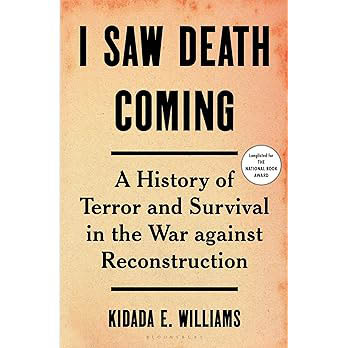
The latest book by Wayne State University professor and celebrated historian Kidada E. Williams, Ph.D., has been nominated for the 2023 National Book Award for Nonfiction, one of the most prestigious literary honors in the country.
Williams’ book, I Saw Death Coming: A History of Terror and Survival in the War Against Reconstruction, offers a powerful and detailed look at African Americans’ struggles against hatred, violence and systemic racism in the aftermath of the Civil War. The book was named to the National Book Award Longlist last week.

“The National Book Award Longlist is a great honor that makes all the work I did trying to adequately witness African Americans’ testimonies about the violent unmaking of their freedom and to make that story accessible to a large audience feel worthwhile,” Williams said. “It affirms my investment helping people understand how racist violence upends lives and undermines our democracy. I hope this understanding inspires us to make the world more just.”
The 2023 Nonfiction Longlist includes emerging and established writers and features works of memoir, science writing, biographies of both iconic figures and unsung heroes, investigative works that reframe historically significant events, and more.
The National Book Foundation, which presents the awards, announced that it would reveal the finalists on Oct. 3.
In writing I Saw Death Coming, Williams said she wanted to train her focus on the battles that faced average African Americans during that period and to dispel widely held misperceptions about the Reconstruction era, which lasted from 1865 to 1877.
“I think this story of Black people’s fight for freedom and the nation’s betrayal wanted to be written, and I was available,” explained Williams. “I wanted to write a history of Reconstruction that centered ordinary African Americans journeying out of slavery and into the new world taking shape in the Civil War’s wake — and one I thought was truer to the historical records African Americans and their allies created than the popular falsehoods many Americans have about the era.”
The book, which has already earned enormous popularity, has been named an “Editor’s Pick” as one of the “best books so far this year” on Amazon and has further burnished Williams’ already impressive credentials as a leading scholar on Black and American history.
“I’m overjoyed with the reception of the book and the recognition of it as a work that facilitates better understandings of the past, present and future of Black people and the nation,” Williams said. “I know this history of what African Americans gained during the expansion of American freedom and democracy, and then lost to the war against Reconstruction, told from targeted people’s perspectives and in an unsparing way, makes some uncomfortable. But I believe that whistling past these racism-based atrocities, like white terror violence, dishonors victims and survivors, and it means we never learn from them.”
Widely sought after for interviews, Williams has earned a national reputation for her work. She contributes to the National Endowment for the Humanities Summer Seminars and Institutes and is on the Zinn Project's roster of People's Historians, both of which help K-12 teachers broaden their understandings of U.S. history and develop new strategies for teaching challenging subject matter.
Williams also has appeared on Henry Louis Gates's PBS award-winning series, Reconstruction: America after the Civil War; Nikole Hannah-Jones's The 1619 Project series on Hulu; NPR; WDET; and other broadcasts. Her writing has been featured in The New York Times, DAME, Slate and Bridge Magazine.
